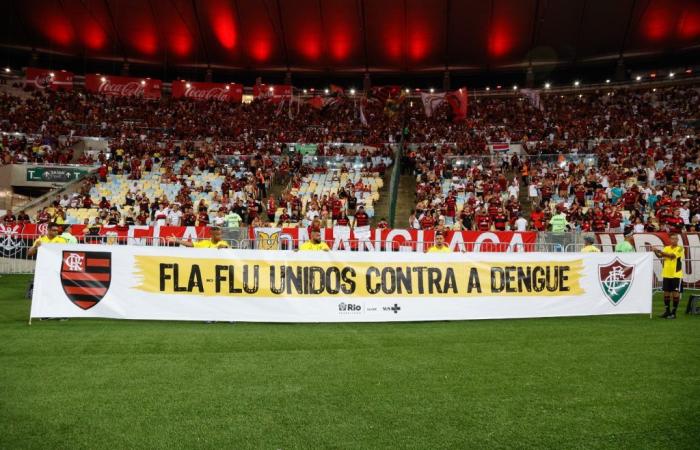
Rio Without Dengue Campaign at Fla-Flu do Maracanã – Rio City Hall
The four big clubs in Rio put their rivalry aside in the State Championship in favor of a greater cause: the fight against dengue. Botafogo will take to the field, this Sunday (17/3), for the game against Sampaio Correa for the Rio Cup, at the Nilton Santos Stadium, with messages from the Rio Sem Dengue campaign displayed on the stadium’s big screen. On Saturday (16/3), in the match that defined one of the finalists, Flamengo and Fluminense came together to remember the importance of prevention and showed Maracanã a 13 meter long banner, printed with the shields of both teams. On the 3rd, Vasco da Gama played against Portuguesa, at the São Januário Stadium, wearing a special shirt.
The partnership between the clubs and the Municipal Health Department (SMS) seeks to give visibility to the actions developed in the city of Rio to combat the proliferation of the Aedes aegypti mosquito and promote popular adherence to prevention measures.
The fight against dengue must be a social pact in which the whole of society gets involved; every citizen can do their part to prevent the proliferation of Aedes aegypti. When necessary, the population can request an inspection or report possible mosquito outbreaks through the City Hall Call Center, on telephone 1746.
The main recommendations for the population are to avoid stagnant water in their homes in containers such as plant pots, old tires, water barrels, swimming pools, bottles and containers, among others; periodically clean places such as trash cans, drains, animal drinking fountains and other objects that can accumulate water; do not dump garbage irregularly in vacant lots and other inappropriate places.
In case of symptoms such as headache, behind the eyes, in the body and in the joints; High fever; feeling unwell and red spots on the body, it is necessary to seek medical attention as soon as possible. There are 238 Primary Care units throughout the city (family clinics and municipal health centers). And, to increase assistance capacity and reduce pressure on the network, SMS also implemented 11 exclusive service centers for dengue, which are operating in the neighborhoods of Curicica, Campo Grande, Santa Cruz, Del Castilho, Bangu, Madureira, Complexo do Alemão, Botafogo, Tijuca, Benfica and Ilha do Governador.
Carried out by calls at Central 1746, vector prevention and control actions have great strategic importance and, for this reason, are intensified in the summer, when weather conditions favor the proliferation of mosquitoes. Until March 9, 2024, 2,015,834 properties were visited to prevent and control Aedes aegypti and 349,685 containers that could serve as mosquito breeding sites were treated or eliminated.
Vaccination campaign for children and adolescents
The dengue vaccination campaign is available for children and adolescents aged 10 to 14 in all 238 Primary Care units in the city, in addition to the Super Centro Carioca de Vaccination, in Botafogo, which is open every day, from 8am to 10pm ; and the Super Centro Carioca de Vaccination, Campo Grande unit, located at ParkShoppingCampoGrande, which is also open daily, according to the shopping center’s opening hours.
The expectation is to vaccinate the 354,000 children and adolescents in this age group who live in the city of Rio, including those who have already had dengue fever. Exceptions are pregnant women, nursing mothers, people with congenital or acquired immunodeficiency — such as immunosuppressive therapies, symptomatic HIV infection or evidence of compromised immune function — and people with hypersensitivity to vaccine components. Anyone who has recently had dengue fever must wait six months since the onset of symptoms to receive the vaccine, and anyone who has symptoms of the disease (such as fever and body pain) should seek medical attention and evaluate the possibility of vaccination.
To receive the vaccine, minors must be accompanied by a guardian and present an identity card or birth certificate. The vaccination schedule is two doses, with an interval of three months between them. The age group for the campaign was selected by the Ministry of Health as it presents a higher risk of hospitalization due to the disease.
Tags: Football clubs join Department Health Rio Dengue campaign Rio Janeiro City Hall
--




